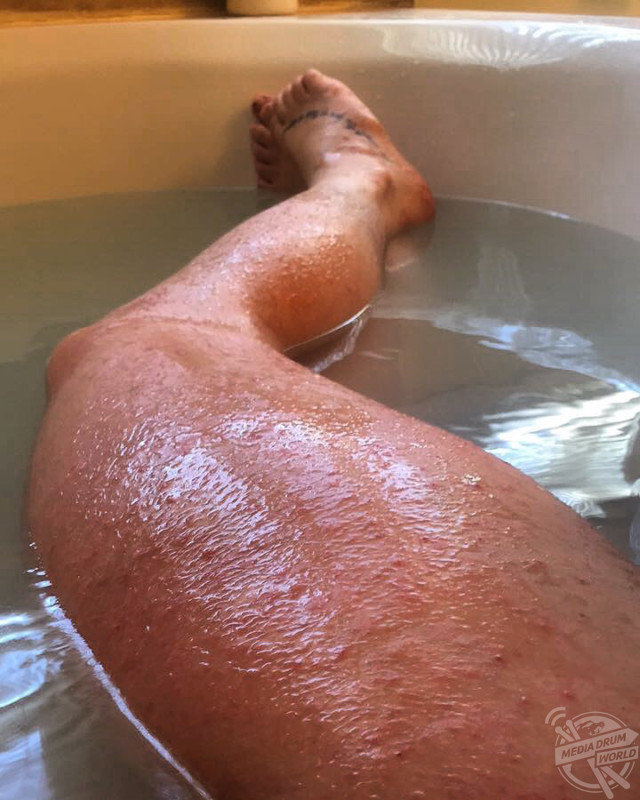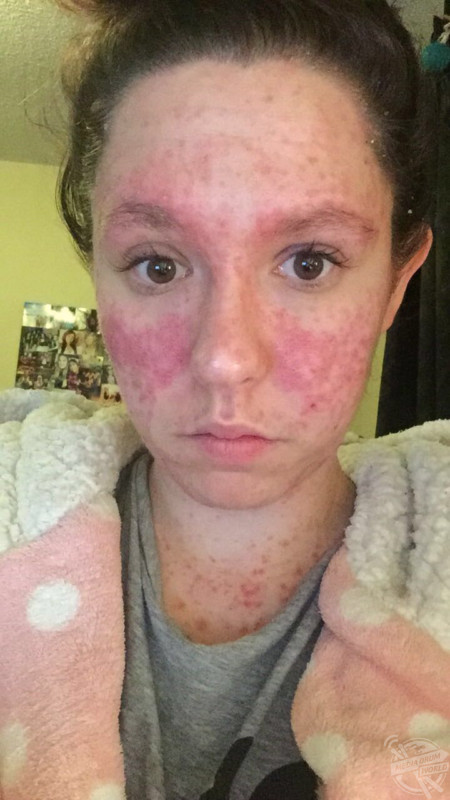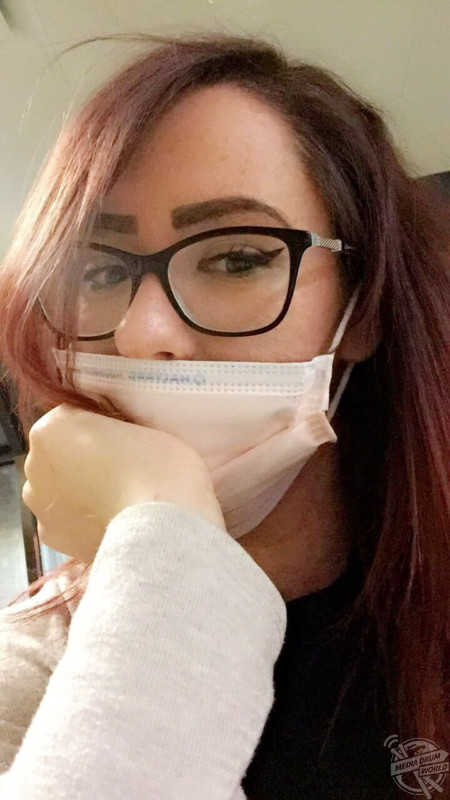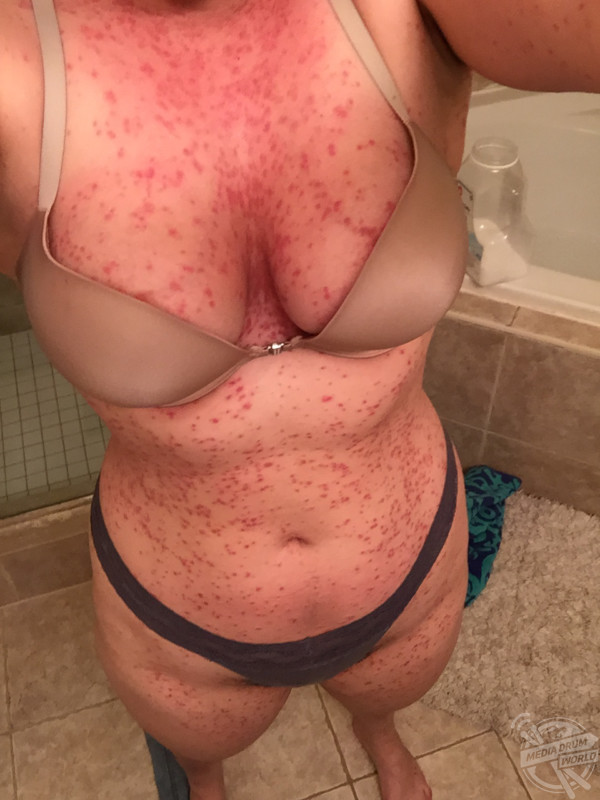
By Alyce Collins
THIS WOMAN was treated like a leper by stumped doctors and colleagues until a dermatologist eventually diagnosed her with a severe case of psoriasis.
Retail manager, Marina Tirabassi (23) from Ontario, Canada, found herself overloaded with work as well as studying when she started noticing patches of psoriasis on her body because of the stress.

Marina Tirabassi / MDWfeatures
However, when her psoriasis spread all over her body, the diagnosis she received from the doctors wasn’t what she anticipated when they told her it was Scarlet Fever and made her wear a mask in case she was contagious.
Marina’s psoriasis started on her chest, but it soon began developing on her face and stomach. At first, she tried not to worry about the small patches because she was aware that stress could affect her skin, but once it was covering her body she sought a medical diagnosis.

Marina Tirabassi / MDWfeatures
The first doctor Marina saw diagnosed her skin condition as Scarlet Fever and gave her antibiotics, but after two weeks of no change, Marina began doubting this diagnosis. The second time round, Marina had blood tests taken and was tested for measles and mumps, but every test came back negative.
After a month of getting no answers, Marina searched for a dermatologist who finally gave her the diagnosis of Guttate Psoriasis, an autoimmune disease which can cause spots of itchy, red skin all over.

Marina Tirabassi / MDWfeatures
“In April 2017 I took a promotion at work and I was taking on more hours than I was used to, and I had a lot of responsibilities,” said Marina.
“Normally I wouldn’t have had any issues with that, but it all happened right in the middle of my final exams, so I wasn’t sleeping or eating properly. I then came down with strep throat as my body was so weak.

Marina Tirabassi / MDWfeatures
“The first patch I noticed was on my chest, but I only began to really notice it after it developed on my face. It wasn’t until it appeared on my stomach that I became concerned.
“When I was first diagnosed with Scarlet Fever I knew it was weird, but the rash looked very similar to the symptoms, so I trusted my doctor and didn’t think much of it.

Marina Tirabassi / MDWfeatures
“I continued taking the antibiotics that he prescribed, and it wasn’t until two weeks later when it still wasn’t going away that I started to doubt the diagnosis.
“I took a trip to the hospital because I’d never seen anything like it. The doctors ran a whole bunch of blood tests and they were all stumped, so they just gave me Benadryl and sent me on my way.

Marina Tirabassi / MDWfeatures
“I felt completely defeated. I sat in the hospital for eight hours while they continued to poke at me and take my blood.
“Even the woman in triage forced me to wear a mask and everyone treated me like I was contagious. I didn’t even take the Benadryl because I knew it wasn’t an allergy.
“After a month of not knowing what was wrong, I finally went to see a dermatologist who eventually diagnosed me with Guttate Psoriasis.”

Marina Tirabassi / MDWfeatures
Guttate psoriasis can be triggered by bacterial infections as well as stress, and it causes red droplet-size marks on the skin. For some, this type of psoriasis will disappear within a matter of weeks, but cases like Marina’s can take longer.
When Marina was finally told correctly what her condition was, she was able to change a few factors in her lifestyle in the hopes of improving her psoriasis.
“The dermatologist knew what was wrong with me as soon as she looked at my skin and asked about the symptoms,” said Marina.

Marina Tirabassi / MDWfeatures
“As soon as she knew I had strep throat right before it happened, combined with an intense amount of stress, she knew. She didn’t even have to do the skin biopsy.
“In that moment I had so many mixed emotions. I felt incredibly relieved and happy that someone could finally tell me what was going on.
“I was happy that I would finally be able to start an appropriate treatment that would actually help me. But I did feel incredibly low because I didn’t know much about auto-immune diseases at that time.
“Hearing the word ‘incurable’ made me feel defeated. I didn’t feel like the treatment would work and I believed my skin would look this horrible and be this painful for the rest of my life.

Marina Tirabassi / MDWfeatures
“I scratched my skin far too often. It’s so incredibly dry and itchy, so it’s very difficult to resist itching it. I kept trying to remind myself that if I scratched it I would leave my skin scarred.
“When I went out in public I couldn’t handle the looks from most people. I had people at work ask if I was contagious and I began to feel ashamed of showing my skin.
“I covered up as much as possible to avoid this. I also started doing a lot of research into psoriasis and natural diets to help flare-ups.
“I tried to stay away from junk food and foods which are high in saturated fats and refined sugar which can promote inflammation. I also stopped drinking because alcohol is really bad for flare-ups.”

Marina Tirabassi / MDWfeatures
Another factor which has helped towards Marina’s skin clearing up is UVB phototherapy treatment which had an instant effect.
“Phototherapy involves exposing the skin to ultraviolet light on a regular basis under medical supervision,” Marina added.
“I had to drive an hour and a half away to Toronto three times a week to do the therapy. UVB slows the growth of affected skin cells.
“The results from this were pretty much immediate. I noticed changed after the first three sessions of UVB. It started to reduce the redness immediately and I was left with just light spots on my skin which eventually cleared away.

Marina Tirabassi / MDWfeatures
“I feel very proud of myself. Right now, my skin is completely clear, and it’s made me feel super confident.
“Although I do still have moments where I feel depressed and scared that it will return at any moment, I do my best to remain positive and to use my experience to spread awareness about autoimmune diseases.
“I feel like a warrior, and I may be fearful that it could return, but I know I can handle it.
“I haven’t experienced a big flare-up since completing the treatment. I still get small patches here and there, but nothing that’s really itchy or uncomfortable.
“The biggest challenge I had during that time was having to answer, ‘are you contagious?’. The biggest thing that contributed to feeling so low was the looks of disgust that people gave me for something over which I had no control.
“It was difficult, but I began to realise that I can’t blame people for looking at me like that because they’re not educated about my condition.

Marina Tirabassi / MDWfeatures
“Covering up my experience won’t help spread awareness about autoimmune diseases. We live in a society that is so corrupted by what we see in the media so when we see someone who looks different, we automatically assume it’s abnormal.
“I decided to embrace my psoriasis, so I could help people understand and help others who are going through something similar.
“Treating my condition has allowed me to feel comfortable in my own skin. Before this, I had such an altered idea of what it means to be beautiful. Living with psoriasis has taught me patience because it takes time to heal.”
To find out more, visit Marina’s Instagram, @psoriasis_warrior66









